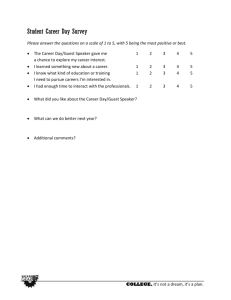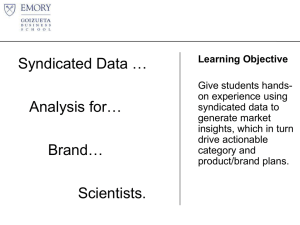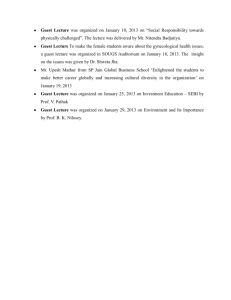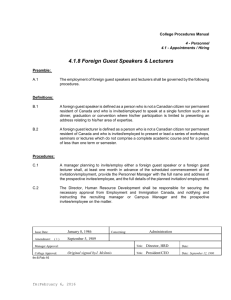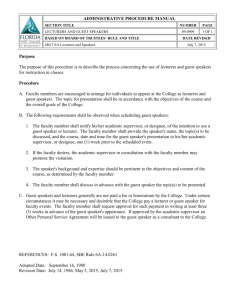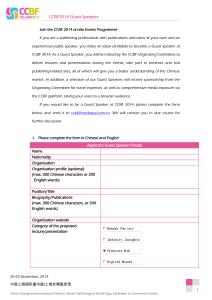Syllabus
advertisement
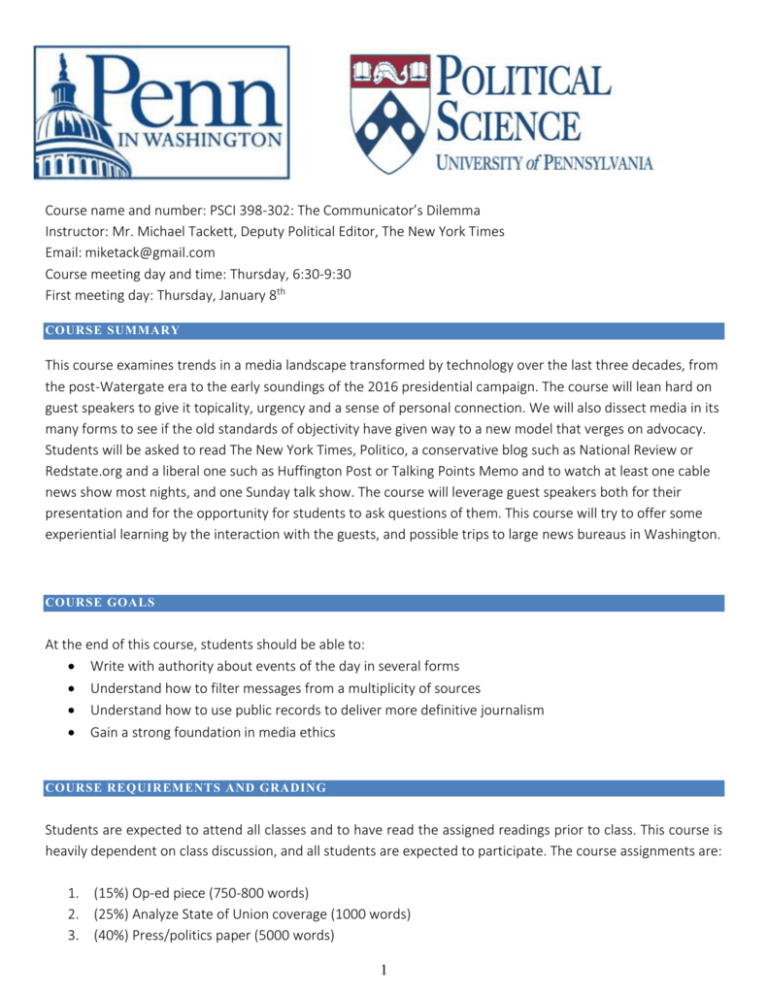
Course name and number: PSCI 398-302: The Communicator’s Dilemma Instructor: Mr. Michael Tackett, Deputy Political Editor, The New York Times Email: miketack@gmail.com Course meeting day and time: Thursday, 6:30-9:30 First meeting day: Thursday, January 8th COURSE SUMMARY This course examines trends in a media landscape transformed by technology over the last three decades, from the post-Watergate era to the early soundings of the 2016 presidential campaign. The course will lean hard on guest speakers to give it topicality, urgency and a sense of personal connection. We will also dissect media in its many forms to see if the old standards of objectivity have given way to a new model that verges on advocacy. Students will be asked to read The New York Times, Politico, a conservative blog such as National Review or Redstate.org and a liberal one such as Huffington Post or Talking Points Memo and to watch at least one cable news show most nights, and one Sunday talk show. The course will leverage guest speakers both for their presentation and for the opportunity for students to ask questions of them. This course will try to offer some experiential learning by the interaction with the guests, and possible trips to large news bureaus in Washington. COURSE GOALS At the end of this course, students should be able to: Write with authority about events of the day in several forms Understand how to filter messages from a multiplicity of sources Understand how to use public records to deliver more definitive journalism Gain a strong foundation in media ethics COURSE REQUIREMENTS AND GRADING Students are expected to attend all classes and to have read the assigned readings prior to class. This course is heavily dependent on class discussion, and all students are expected to participate. The course assignments are: 1. (15%) Op-ed piece (750-800 words) 2. (25%) Analyze State of Union coverage (1000 words) 3. (40%) Press/politics paper (5000 words) 1 4. (20%) Class participation ASSIGNMENT DETAILS 1. Op-ed Piece: Deliver a written opinion column of 800 words 2. State of the Union: Students will be asked to write a 1,000 word analysis of President Obama’s State of the Union address. This analysis will be due 48 hours after the end of the speech. Students will also be asked to live Tweet the speech and submit a copy of their Twitter feed. Students will be asked to write a comparative analysis of the coverage of the speech by watching Fox News and CNN, and by comparing the New York Times and the Wall Street Journal, the Huffington Post, and Breitbart. This assignment should be no more than 1,000 words and is due a week from the date of the speech 3. As a final project, students will write up to 5,000 words on some of the most pressing issues facing modern media companies. For example, should newspapers continue to publish straightforward accounts on the front page of events that took place the previous morning? How should media companies attempt to monetize social media? Should media companies stop some very popular websites from linking to material without compensation in the name of building a larger audience? 4. Each student will be asked to engage in discussion about specific stories that are dominating coverage of the day. This will include active discussion from the news sources students are asked to read to demonstrate a fluency in contemporary matters and to be able to discern bias. STUDENT CONDUCT AND RESOURCES Students are expected to submit their own work, and presenting the work of others as their own is not acceptable. Please read Penn’s policy on plagiarism http://www.vpul.upenn.edu/osl/acadint.html and if you are unsure about what constitutes plagiarism, please feel free to ask. All assignments are to be well written and to be submitted for grading on the date due. Grades will be reduced for late papers. For stylistic guidance, the recommended handbook is Strunk and White, The Elements of Style. Final grades of Incomplete will not be given except under extraordinary circumstances such as medical emergencies. Outside these extraordinary circumstances, if work has not been completed by the end of the course, a final grade will be assigned based on the best information available in the sole discretion of the professor. READINGS Articles in addition to the books suggested for purchase below will be posted on Canvas. Required: This Town by Mark Leibovich The Victory Lab by Sasha Issenberg Blur: How to Know What’s True in the Age of Information Overload by Bill Kovach and Tom Rosentiel Boys on the Bus by Timothy Crouse What it Takes by Richard Ben Cramer. 2 SCHEDULE BY WEEK Week 1 : January 8 Topic: Introduction No readings or speaker Week 2 : January 15 Topic: This Town: A primer on how Washington really works beyond its official boundaries. Reading: This Town, Mark Leibovich GUEST SPEAKER: Mark Leibovich, The New York Times Week 3 : January 22 Topic: Data: The era of big data in political reporting, and why it matters. Examining new forms of storytelling like The Upshot. Reading: GUEST SPEAKER: Nate Cohn, The Upshot, The New York Times Week 4: January 29 Topic: White House: The most prestigious, and often, most difficult beat in town. Reading: GUEST SPEAKERS: Christi Parsons, Los Angeles Times, and Lisa Lerer, Bloomberg (Penn grad) Week 5: February 5 Topic: Congress: While the White House is a fortress, Congress is an open field, rich with reporting opportunity. Reading: GUEST SPEAKERS: Paul Kane, The Washington Post, and Manu Raju, Politico Week 6: February 12 Topic: Social Media: How Twitter is changing the way American politics functions. Reading: GUEST SPEAKER: Adam Sharp, Twitter Week 7: February 19 Topic: Columns/Blogs: How they are done. Will they last? Reading: GUEST SPEAKERS: Mike Allen, Politico, and Ron Fournier, National Journal Week 8: February 26 Topic: Speed/Television: The old skill is now the new skill. Reading: GUEST SPEAKER: Peter Canellos, Executive Editor, Politico 3 Week 9: March 5 Topic: Doing It All: On writing, on air, and using social media Reading: GUEST SPEAKER: Jeff Zeleny, ABC News Week 10: March 12 Topic: Influence: Examining Washington’s powerful influence industry Reading: GUEST SPEAKER: Eric Lipton (Penn grad), The New York Times Week 11: March 19 Topic: Investigating Powerful Institutions: A Guide Reading: GUEST SPEAKER: Matt Apuzzo, The New York Times Week of March 23 (Spring break week; no classes and internships end) Week 12: April 2 Topic: 2016: A Viewer’s guide to the presidential campaign Reading: GUEST SPEAKERS: Dan Balz, The Washington Post, and Jonathan Martin, The New York Times Week 13: April 9 Visit to several major news bureaus, including The New York Times, ABC News and Bloomberg Week 14: April 16 Visit White House briefing room (last day of instruction for the semester is April 17, move out day is April 18) 4
